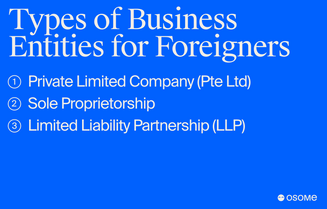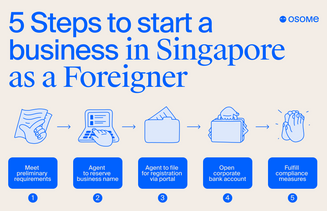A Complete Guide to Setting up a Business in Singapore for a Foreigner
- Modified: 10 December 2025
- 10 min read
- Starting a Company


Gabi Bellairs-Lombard
Author
Gabi's passionate about creating content that inspires. Her work history lies in writing compelling website copy and content, and now specialises in product marketing copy. When writing content, Gabi's priority is ensuring that the words impact the readers. As the voice of Osome's products and features, Gabi makes complex business finance and accounting topics easy to understand for small business owners.

Deepti Laddha
Reviewer
Deepti Laddha, our Head of Corporate Operations in Singapore, brings a decade of experience to her role, supporting our business writers in crafting insightful and engaging articles. With a strong background in corporate services, Deepti is a rich source of knowledge and expertise. We can count on her to assist in transforming any definition, concept or complicated jargon into helpful tips that help our readers take their businesses to the next level.

Nisah Rahim
Reviewer
Nisah Rahim is our go-to expert reviewer for all things Corporate Secretary-related in Singapore. As the Corporate Secretary Team Lead and content reviewer, Nisah meticulously examines our blog posts to ensure we provide comprehensive information on Corporate Secretary services such as local regulatory compliance, managing board meetings, maintaining company records, and providing expert advice on corporate governance matters.
Starting a business in Singapore as a foreigner has never been more appealing. With its business-friendly regulatory environment, competitive tax regime, and stable political environment, it’s no wonder Singapore has become a magnet for foreign entrepreneurs seeking to establish their ventures. If you're looking to start a business in Singapore, this guide has got you covered! We'll help you choose the right business structure, navigate the legal requirements and licensing process, and make sure your journey is smooth and successful. So, let's get started!
Key Takeaways
- Singapore offers attractive benefits to foreign entrepreneurs, including 100% foreign ownership and competitive tax rates.
- Foreigners in Singapore have several business entity options, such as Private Limited Company (Pte Ltd), Sole Proprietorship, and Limited Liability Partnership (LLP).
- To successfully open a Singapore company, foreigners must fulfil certain conditions, procure a work pass, appoint a local or resident director, open a corporate bank account, and navigate legal compliance and licensing requirements. Adhere to employment regulations for hiring locals and filing deadlines set by the Accounting and Corporate Regulatory Authority (ACRA).
Why Singapore Is Attractive for Foreign Entrepreneurs
Singapore stands out as a prime destination for foreign business owners due to its:
- 100% foreign ownership policy
- Competitive tax regime
- Flexible banking facilities
- Stable political and social environment
Furthermore, foreigners are allowed to have full ownership of a company’s shareholding, with a varying company registration fee depending on the business entity chosen. The country’s corporate tax rate is just 17%, and sole proprietors must only pay personal income tax on their business profits.
The reliable political system and strong economic outlook make Singapore an ideal business location. The incorporation procedure entails submitting incorporation documents to the ACRA and adhering to statutory regulations concerning taxation, employment law, and intellectual property.
Overall, incorporating a foreign company in Singapore offers numerous advantages, such as tax efficiency, government incentives, a robust legal framework, and a positive reputation for conducting business.
Types of Business Entities for Foreigners
Foreigners in Singapore can choose from various business entities, including Private Limited Company (Pte Ltd), a separate legal entity, Sole Proprietorship, and Limited Liability Partnership (LLP), each with its unique set of benefits and drawbacks. Understanding these business structures will help you make an informed decision when opening a Singapore company and select the most suitable option for your venture.

Private Limited Company (Pte Ltd)
A Private Limited Company (Pte Ltd) is a popular choice for both local and foreign entrepreneurs, as it is considered the most favourable company structure for Singapore company owners regarding scalability, credibility, and tax benefits. It is owned by shareholders, operates as a separate legal entity and is limited by the number of shares issued, with a maximum of 50 shareholders allowed. A minimum paid-up capital of at least S$ 1 is required to establish a new private limited company, including setting up a subsidiary Singapore company if needed.
Engaging a registered filing agent is necessary for those who aim to incorporate a private limited company in Singapore. The agent will assist in filing the application to set up your company in Singapore. Moreover, this business structure is perceived as more reliable than a sole proprietorship or partnership, and its favourable tax regime can facilitate capital acquisition for business expansion as a more prominent Singapore company.
Foreigners intending to manage their company in Singapore must procure an Employment Pass (EP). This pass is specifically designed for professionals and executives, allowing them to work and manage their companies in Singapore.
Sole Proprietorship
A Sole Proprietorship is a business entity owned and managed by a single individual, making it the most straightforward and cost-effective business structure to establish in Singapore. However, the proprietor assumes personal liability for the enterprise’s debts and losses, which are unlimited.
Despite the simplicity of a sole proprietorship, this kind of business may not be the best option, as it does not have a separate legal identity from its owner and may be perceived as less credible than other foreign companies. Furthermore, the proprietor is required to pay personal income tax on any profits generated from the business in Singapore.
Limited Liability Partnership (LLP)
A Limited Liability Partnership (LLP) is a flexible business entity that combines the advantages of a partnership and a company, offering limited liability protection to its owners. It is particularly suitable for professional services firms, as it allows them to leverage their respective skills and generate profits.
While an LLP provides limited liability protection, it may not be the best choice for all foreign entrepreneurs, as it may have more complex management and regulatory requirements than other business types. When considering the LLP structure, entrepreneurs should take into account how the personal income tax obligations of the partners may impact their overall tax liabilities.
Ultimately, the choice of the right business structure will depend on the unique needs and goals of the foreign entrepreneur looking to open a company in Singapore.
| Feature | Pte Ltd | Sole Proprietorship | LLP |
| Legal Status | ✅ Separate legal entity | ❌ No legal separation | ✅ Liability protection |
| Liability | ✅ Limited to shares | ❌ Unlimited personal liability | ✅ Limited liability |
| Taxation | ✅ Corporate tax benefits | ❌ Personal income tax | ❌ Personal partner tax |
| Ease of Setup | ❌ Moderate (agent required) | ✅ Simple and low-cost | ❌ Moderate (agreements needed) |
| Credibility | ✅ High | ❌ Low | ⚖️ Moderate |
| Best For | 🌱 Growth-focused ventures | 🏠 Small, low-risk businesses | 🤝 Professional partnerships |
A Private Limited Company offers limited liability, corporate tax benefits, and greater credibility, making it ideal for entrepreneurs seeking growth and long-term success despite higher compliance requirements.
Requirements for Registering a Company in Singapore as a Foreigner
Foreigners must fulfil certain conditions for the successful registration of a company in Singapore. To manage their company in Singapore, foreign entrepreneurs must procure a work pass like the Employment Pass (EP), EntrePass, or Tech.Pass. These work passes come with their own eligibility criteria and benefits, as discussed in Section 4.

Additionally, foreigners must appoint a local or resident director to comply with Singapore’s company registration requirements. This can be a friend or family member if they meet the age and legal capacity requirements. Alternatively, a nominee director service can be engaged to provide temporary or long-term assistance in fulfilling compliance and statutory requirements for the Singapore company.
Work Visas
Several work visa options like the Employment Pass (EP), EntrePass, and Tech.Pass are available to foreigners wishing to start a company in Singapore. Each of these work passes has its own eligibility criteria and benefits, catering to different types of entrepreneurs and professionals.
Employment Pass (EP)
The Employment Pass (EP) is a work visa suitable for professionals, managers, and executives, allowing them to work and manage their Singapore company as foreign company owners. To be eligible for an EP, applicants must:
- Possess a tertiary or degree certification
- Be a professional or executive
- Have a minimum monthly salary of S$ 5,600
EP holders can also enjoy family-friendly benefits, such as the ability to apply for dependent passes for their spouse or children, provided they meet the qualifying salary of S$ 6,000.
When applying for an Employment Pass (EP) in Singapore, note that the minimum qualifying salary increases with age and experience. While the base salary starts at S$ 5,600 per month, applicants aged 45 and above may need to earn up to S$ 10,700, and those in the financial services sector may require S$ 11,800 per month.
EntrePass
The EntrePass, also called an Entrepreneur Pass, is a work pass specifically designed for foreign entrepreneurs with innovative business ideas and venture-backed startups. To be eligible for an EntrePass, applicants must have already started or intend to start an ACRA-registered Singapore private limited company that has been registered for a period of less than six months on the date of the EntrePass application.
The EntrePass application process requires the submission of various documents, such as:
- The personal particulars page of the international passport
- Past employment testimonials
- The company’s latest business profile from Bizfile
- A business plan
- Other supporting documents like licensing agreements or patents.
Tech.Pass
The Tech.Pass is a new work pass for highly qualified foreign professionals and experts. This pass targets elite foreign professionals and experts in areas such as ecommerce, AI, and cybersecurity.
Administered by the Economic Development Board (EDB) in Singapore, the Tech.Pass grants established tech entrepreneurs, leaders, or technical experts from around the world the opportunity to work in the technology industry in Singapore. It provides a unique opportunity for these professionals to contribute to the growth of Singapore’s technology ecosystem.
Appointing a Local Director and a Corporate Secretary
As part of the company registration process in Singapore, foreigners must appoint a local or resident director and a company secretary to comply with local regulations and Singapore company law. The local director must be at least 18 years old and of full legal capacity, while the corporate secretary should be a permanent resident of Singapore.
The company secretary is considered an officer of the company and acts as a liaison between the company and the relevant authorities — think of the company secretary as the middleman between your company and the government, ensuring compliance with Singapore company law. Meanwhile, the local director is responsible for adhering to the framework and acting in the company's best interests and may also be appointed to undertake additional duties with a limited power of attorney.
Many business people looking to complete company incorporation will outsource a corporate service provider to streamline the process of appointing a corporate secretary, local director, or nominee director for them.
Outsourcing a professional corporate secretary ensures your company stays compliant with Singapore regulations, manages statutory filings, and maintains seamless communication with authorities. Pair this with a trusted local director service for a hassle-free incorporation process.
Opening a Corporate Bank Account
Opening a corporate bank account in Singapore is essential for business operations and financial transactions and to complete the company incorporation process. Various local and international banks offer attractive options, provided with the necessary banking facilities to manage their business finances. Osome is a proud partner of several local banks who we connect aspiring business owners of private limited companies and foreign companies with. And our bank account opening assistance is part of our company registration fee.
Providing all the documents like the company incorporation certificate, a replica of the company’s constitution, and identification documents for the company directors and signatories is a prerequisite for foreign entrepreneurs to open a corporate bank account. Selecting a bank that best suits the company’s needs and requirements is crucial, especially if you're a foreign business owner looking to create an established company in Singapore.
Navigating Legal Compliance and Licensing
Foreign business owners must navigate legal compliance and obtain relevant licenses for their Singapore business activities. Certain industries, such as:
- food and beverage
- construction
- finance
- education
Entrepreneurs, including those with an Employment Pass, require specific licenses to conduct business in Singapore. Ensuring legal compliance and obtaining the necessary licenses is paramount for a successful business venture.
Business owners should familiarise themselves with Singapore’s employment regulations, including the Employment of Foreign Manpower Act (EFMA) and the Employment Act. These regulations, applying to both local and foreign employees, cover aspects like work rights, prevention of mistreatment, and eligibility criteria for hiring migrant workers. Staying informed and adhering to these regulations in their business operations is essential to ensure compliance and avoid any potential legal issues.
Securing the right licenses and adhering to employment laws, such as the EFMA and Employment Act, is critical for operating in Singapore. Partnering with experts can streamline compliance, protect your business, and ensure smooth operations in regulated industries.
Government Assistance and Incentives for Foreign-Owned Businesses
Singapore offers various government assistance and incentives for foreign-owned businesses, including grants, loans, and tax breaks. These support programs aim to foster innovation and growth among local and foreign businesses in the country.
Examples of government assistance programs include:
- SME Working Capital Loan and SME Micro Loan for financial support
- Corporate Income Tax Rebate and Productivity and Innovation Credit Scheme for tax benefits
- Startup SG Founder, Startup SG Tech, and Enterprise Development Grant for startup funding and development.
Hiring Local Employees and Adhering to Employment Regulations
Hiring local employees is crucial for business growth and success in Singapore. Foreign entrepreneurs should abide by the country’s employment regulations and guidelines like the Fair Consideration Framework, which promotes local hiring before recruiting foreigners.
In addition, foreigners must comply with the Employment of Foreign Manpower Act (EFMA) and the Employment Act, which cover aspects such as work rights, mistreatment prevention, and eligibility criteria for hiring migrant workers. Ensuring compliance with these regulations will help maintain a positive work environment and avoid any potential legal issues.
Annual Filing Requirements and Deadlines
To maintain compliance with local regulations, companies in Singapore need to meet annual filing requirements and deadlines. This includes submitting financial statements and annual returns to the Accounting and Corporate Regulatory Authority (ACRA).
The deadline for filing the corporate income tax return is 30 November of the Year of Assessment. By staying informed about filing requirements and deadlines, foreign entrepreneurs can ensure their businesses remain compliant and avoid any penalties or legal issues. Exploring company incorporation services with the help of a registered filing agent is a good starting point if you want to establish your company in Singapore.
How Osome Helps With Incorporation for Foreign Entrepreneurs
Setting up a company in Singapore as a foreigner can be complex, but Osome simplifies the process. As a registered filing agent, Osome handles everything 100% online, from collecting necessary documents to completing the legal filings with ACRA. Every plan includes essential incorporation services: a nominee director, registered address, and corporate secretary support. Osome’s team of local experts also guides foreign entrepreneurs through tailored onboarding, assists with Employment Pass and Dependant’s Pass applications, and offers integrated accounting, bookkeeping, and tax support from day one.
Summary
In conclusion, setting up a business in Singapore as a foreigner offers numerous opportunities for growth and success, thanks to the country’s business-friendly environment, attractive tax regime, and government support for foreign-owned businesses. By carefully selecting the right business structure, obtaining the necessary work visas, and adhering to local regulations and guidelines, foreigners can pave the way for a thriving and profitable venture in the vibrant and dynamic Singaporean market.






